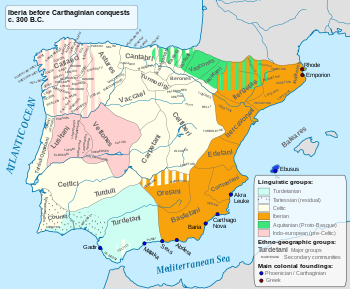
Back Galaicos AST Калаики Bulgarian Kallaiked Breton Galaics Catalan Gallaeker German Galaicos Spanish Galeziar Basque Gallaeci French Galaicos Galician Gallaecusok Hungarian


The Gallaeci (also Callaeci or Callaici; Ancient Greek: Καλλαϊκοί) were a Celtic tribal complex who inhabited Gallaecia, the north-western corner of Iberia, a region roughly corresponding to what is now the Norte Region in northern Portugal, and the Spanish regions of Galicia, western Asturias and western León before and during the Roman period.[1][2] They spoke a Q-Celtic language related to Northeastern Hispano-Celtic, called Gallaecian or Northwestern Hispano-Celtic.[3][4] The region was annexed by the Romans in the time of Caesar Augustus during the Cantabrian Wars, a war which initiated the assimilation of the Gallaeci into Latin culture.
The endonym of modern-day Galicians, galegos, derives directly from the name of this people.
- ^ Luján, E. R. (2006). "PUEBLOS CELTAS Y NO CELTAS DE LA GALICIA ANTIGUA: FUENTES LITERARIAS FRENTE A FUENTES EPIGRÁFICAS" (PDF). Xxii seminario de lenguas y epigrafía antigua. Retrieved 16 July 2021.
- ^ 'If, as is the first criterion of this Encyclopedia, one bases the concept of ‘Celticity’ on language, one can apply the term ‘Celtic’ to ancient Galicia', Koch, John T., ed. (2006). Celtic culture: a historical encyclopedia. ABC-CLIO. pp. 790. ISBN 1-85109-440-7.
- ^ Luján Martínez, Eugenio R. (3 May 2006). "The Language(s) of the Callaeci". E-keltoi. 6: The Celts in the Iberian Peninsula: 689–714. Retrieved 21 December 2010.
- ^ ' In the northwest of the Iberian Peninsula, and more specifically between the west and north Atlantic coasts and an imaginary line running north–south and linking Oviedo and Mérida, there is a corpus of Latin inscriptions with particular characteristics of its own. This corpus contains some linguistic features that are clearly Celtic and others that in our opinion are not Celtic. The former we shall group, for the moment, under the label northwestern Hispano-Celtic.'Jordán Cólera, Carlos (16 March 2007). "Celtiberian" (PDF). E-keltoi. 6: The Celts in the Iberian Peninsula: 750. Retrieved 21 December 2010.
© MMXXIII Rich X Search. We shall prevail. All rights reserved. Rich X Search